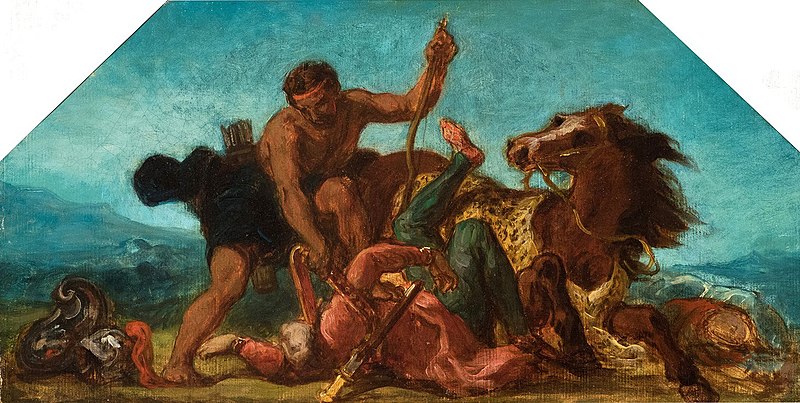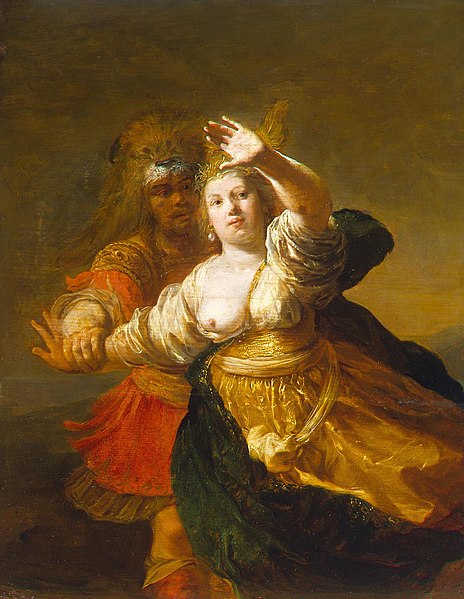HIPPOLYTA IN GREEK MYTHOLOGY
Queen Hippolyta in Greek Mythology
Hippolyta was a Queen of the Amazons in Greek mythology, famous for her ownership of a Golden Girdle which Heracles was tasked with obtaining.
Hippolyta Daughter of Otrera
Hippolyta was named as a daughter of Otrera, Queen of the Amazons, and Ares the Greek god of Bloodlust.
Otrera is sometimes named as the mother of all Amazons, although this is also something said of the nymph Harmonia; specifically, Otrera is named as mother of Amazon queens, including, Hippolyta, Antiope and Penthesileia.
Otrera is sometimes named as the mother of all Amazons, although this is also something said of the nymph Harmonia; specifically, Otrera is named as mother of Amazon queens, including, Hippolyta, Antiope and Penthesileia.
Hippolyta's GirdleAs a sign of her right to rule the Amazons, Hippolyta would be presented with a magnificent Golden Girdle from her father, Ares.
The fame of the Golden Girdle, or the Belt of Hippolyta, reached across the Ancient world, and King Eurystheus wished to present it to his daughter, Admete. Thus, Heracles was dispatched by the king, for the retrieval of the girdle became the hero’s Ninth Labour. Heracles, and a band of comrades, perhaps including Theseus, sailed to Themiscyra, and there, Heracles demanded the Girdle of Hippolyta. Hippolyta seems to have been willing to hand over the girdle to Heracles, and went aboard his ship to present it to him. At this time though, Hera, disguised as an Amazon, went amongst the other Amazons and spread the rumour that Heracles was trying to abduct their queen. The Amazons therefore rushed to Heracles’ ship with weapons drawn, Heracles, observing the incoming threat, was said to have killed Hippolyta, and fought off the attacking Amazons, before sailing away. |
|
The Abduction of HippolytaThe death of Hippolyta is arguably the version of the myth of the Amazon Queen that makes the most sense, but in some sources, Hippolyta did not die, but was instead abducted; at this point, the stories of Hippolyta and Antiope, overlap, and arguably, everything that goes afterwards refers to Antiope rather than Hippolyta.
In any case, if Hippolyta was alive and onboard Heracles’ ship when it sailed from Themiscyra, then Heracles was said to have presented the Amazon Queen to Theseus, to be his wife. Hippolyta would then give birth to Theseus’ son, Hippolytus. |
Stories of the Death of Hippolyta
|
These events though, were said to have brought about the Attic War, when the Amazons marched upon Athens.
Some tell of the Amazons coming seeking to retrieve Hippolyta, whilst others tell of the Amazon army being led by Hippolyta, for Theseus had now cast her aside, as he sought to marry Phaedra, daughter of Minos. Ultimately, Hippolyta would be killed at Athens, although there are disagreements about how she died. |
|
Some tell that Hippolyta died fighting alongside Theseus, for the Queen of the Amazons was in love with her husband, in which case Hippolyta was killed, possibly accidentally by either Penthesileia, or another Amazon called Molpaida.
Or else, Hippolyta was killed fighting Theseus, with the death wound being inflicted by Theseus, or again, accidentally by Penthesileia or Molpaida.
With Hippolyta dead, the Amazons withdrew from the battlefield in defeat.
Or else, Hippolyta was killed fighting Theseus, with the death wound being inflicted by Theseus, or again, accidentally by Penthesileia or Molpaida.
With Hippolyta dead, the Amazons withdrew from the battlefield in defeat.
|
|
Colin Quartermain - Hippolyta - 1st March 2020

